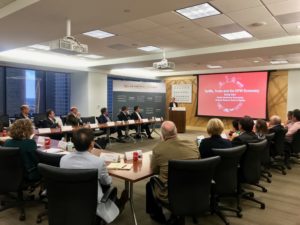Patricia Blasquez, Director of Marketing and Communications, Economic Development & International Engagement
The global economy is under increasing pressure. As growth in international trade continues to slow, and economists raise concerns of a possible economic slowdown in the United States and the world’s major economies, mounting trade tensions are beginning to affect business and consumer confidence.
For export-oriented economies, shifts in U.S. trade policy and tariff regulations can disrupt the flow of business, due to uncertainty and increasing costs. The industry that is perhaps the most directly affected by this is manufacturing. In fact, many U.S. manufacturers have begun delaying investments and hiring plans in response to the escalating U.S.-China trade war. This matters for Texas, which is responsible for 19 percent of U.S. exports, with 78.5 percent of those exports being manufactured goods.
Businesses in Dallas-Fort Worth, particularly those with significant international footprint and activity, have cited trade as a key in the region’s economy. Earlier last month, the Dallas Regional Chamber’s International Engagement team invited the Dallas Federal Reserve to provide some insight on the impact of shifting trade policy on the DFW economy.
Below are some of the takeaways from the Fed’s business survey findings and our discussions at the last International Task Force meeting:

- Tariffs are impacting Texas’ manufacturing industry more than its service sector.
Of 114 manufacturing firms surveyed in Texas, 41 percent noted a negative impact on their business, versus 23 percent in the services industry. Although Texas experienced moderate employment growth across various industries through May 2019, employment in manufacturing and energy declined. Meanwhile, service sector jobs grew by 2.3 percent. Despite this, the service sector anticipates more negative impact in the long term. - Businesses in the Lone Star State are mitigating rising costs and uncertainty by raising fees and finding new suppliers.
The survey showed that tariffs have the strongest effect on costs, profits and outlook. The uncertainty leads to delays in forecasting, decision-making, and capital spending. It also increases costs due to supply chain disruptions, forcing businesses to seek alternate foreign suppliers. Of those surveyed, 41 percent of responders said that they have or will pass the cost to customers to mitigate the negative impacts of tariffs. - DFW’s industry diversity, trade patterns and other attributes may help the region weather the impact of tariffs.
DFW’s economy is highly diversified and more balanced, allowing it to survive market crashes. However, due to the interlinked global supply chain, it is possible that these industries will be impacted greatly by global trade issues.
China remains DFW’s largest trading partner, but our region also has robust trade relations with Australia, Canada, Germany, Mexico, South Korea and Japan, and attracts considerable foreign direct investment (FDI) from those markets. Attracting these types of investment is a good indicator of our region’s economic vitality. Reinforcing our strong trade ties with our North American neighbors, Canada and Mexico, through the United States-Mexico-Canada Trade Agreement (USMCA) would provide more certainty to businesses in the region.
DFW’s industry diversity and trade relationships, in addition to its strong labor force, cost competitiveness, and central location, may be what it takes to help our economy weather the storm.
—
To stay engaged on this and other key international issues, and to learn more about the DRC’s international outreach, connect with our International Engagement team:
Sarah Carabias-Rush
Senior Vice President, Economic Development & International Engagement
srush@dallaschamber.org
Patricia Blasquez
Director, Economic Development & International Engagement
pblasquez@dallaschamber.org